- Home
- Patricia MacLachlan
The Poet's Dog Page 2
The Poet's Dog Read online
Page 2
“Like being a dog,” I say.
Sylvan turns in his chair and peers at me.
“I should take my own advice to Ellie and write about what I love.”
Sylvan pauses.
“I will write about you.”
“The way Ellie wrote about her cat?” I ask.
“Yes,” says Sylvan.
He turns back to his computer and writes furiously.
“Ellie is a poet, you know,” he says. “At long last. The next time she sees you, she’ll hear you speak.”
“I know,” I say, yawning.
The peal of laughter from Sylvan fills the room. After a moment he laughs more at what he’s writing. He coughs a bit at the same time. He has a bottle of medicine and a spoon on his desk. He pours some into the spoon. His cheeks are a little flushed.
After a few minutes he gets up, closes the cover on his computer, and lies down on the couch.
The cough stays with him through the night.
It is the beginning of Sylvan getting sick.
CHAPTER SIX
Something Good
“‘Day three in the cabin during a horrific storm,’” Nickel read dramatically from his notebook. “‘Flora is rummaging through the refrigerator like a hungry weasel, searching for something mysterious, and possibly poisonous.’”
Nickel wrote silently in his notebook every day, and had just begun reading his views of our life in the cabin.
His writing is funny, sly, and sometimes poignant. Sylvan had taught me the word poignant.
“It may be the most important thing in poetry,” Sylvan tells me. “Poignancy.”
Sylvan would have said that Nickel had style.
Not once had Nickel asked to use Sylvan’s computer. The silver computer sat silently on his desk, cover closed. There was something final about that.
Sylvan closes his laptop computer with a snap.
“The end. Done-o!”
The loud word done-o causes me to leap up from a sound sleep.
Sylvan grins at me and brings a pillow over to my red rug. He lies next to me, one arm around me.
Because I am a dog with a good nose and fine ears, I can hear that he is not breathing easily. He doesn’t have the same Sylvan smell that I know.
“You should go to the vet,” I tell him.
“The doctor,” he corrects me.
“Yes.”
“Ellie is driving me to the doctor tomorrow. You can have a nice talk with her.”
His grin is huge.
Flora had become the cook, inventing meals that looked terrible but surprised us by tasting good.
I lap up her soups noisily, the liquid first, then eating whatever she has added at the end.
“That’s a much better way to eat soup than with a spoon,” said Nickel.
“Peanut butter is very hard,” I told him, trying to get it off the roof of my mouth.
“It’s not because I’m a girl that I cook,” Flora explained. “I like it. It’s in the herbs. Like science. When I grow up and have twenty-seven cats and dogs and become a horse trainer, I will have a large collection of herbs.”
Nickel laughed, the cheerful sound cutting through the constant noise of the wind outside.
It reminded me of Sylvan’s laugh.
“I will find a horse; you just watch,” said Flora, turning on the oven.
“And she will,” said Nickel.
Nickel and I went outside to the shed while Flora cooked whatever invention she cooked.
It was still hard to get through the wind and drifts. We both ran with our heads down. When we reached the shed, we opened the door and shut it behind us.
The shed smelled the sweet smell of cut wood. It was strangely warm and quiet.
Nickel leaned against the woodpile for a moment.
“This is where you slept after Sylvan left,” he said, nodding at the pile of gray blankets behind the woodpile.
“Yes.”
“You didn’t want to sleep in the house alone.”
“No.”
“Were you warm enough?”
“Most nights.”
Nickel sighed.
“But what will happen to you after Flora and I go home?”
I didn’t answer.
After a moment Nickel started loading wood into the log carrier.
Just before we opened the door to fight our way back to the cabin, Nickel turned.
“Something good will happen. I know. After all, you once had Sylvan,” he said.
He said it with a poignant tone. That word again.
Poignant.
When we were out in the snow and wind again, walking quickly, Nickel suddenly touched my head.
“Look.”
In the clearing close to the woods stood a deer, the color of dawn, watching us.
“A sign of something good,” said Nickel.
We hurried on, and when we both looked back, the deer was gone.
CHAPTER SEVEN
Going Away
I told them in the morning. I didn’t want to tell them at night. Night could bring dreams.
We were eating pancakes that Flora had made without milk, strange and grainy and wonderful, with lots of maple syrup. I licked the syrup off first, then ate the pancake in small bits.
Nickel watched me and ate his pancake the same way. It made Flora laugh.
Nickel had found the cord to charge the weather box.
“More days of bad weather. Ice is possible before the storm ends. The roads will be cleared after two days. Things will open again. Electricity will be back on in most places.”
“So,” I said suddenly, “Sylvan got very sick.”
I hadn’t meant to say it right out like that.
Nickel put down his fork.
Flora opened her mouth, but for the first time since I’d known her, no words came out.
“You didn’t think he’d just gone away and left me, did you?” I asked. “After all I’ve told you about him?”
Flora shook her head, still silent.
I could see tears at the edges of Nickel’s eyes.
“That’s the story,” I said. “He got sick.”
Ellie comes to drive Sylvan to the doctor. The day is sunny, and she walks into the house without knocking.
“Hello, Teddy,” she says.
She puts her head down next to mine and hugs me.
“Hello, Ellie,” I say.
She grins.
“I can hear you,” she says happily.
“You’re a poet,” I say.
Sylvan comes into the living room dressed in a tweed jacket over a blue shirt.
His eyes are as blue as the shirt.
“Did I hear you two talking?” he asks slyly.
“Yes,” says Ellie. “I’m wondering if my dog, Billy, will talk to me when I get home.”
“No,” says Sylvan, “but don’t worry. You’ll have many hours to read to him.”
Ellie sighs.
“No, Billy is more of a sleeper,” she says.
“I’ll drive,” says Sylvan, who since I’ve known him has only ridden a bike.
Ellie is no fool.
“Do you have a driver’s license?” she asks.
“No, he’s a poet,” I say, making Ellie laugh.
“I’m driving,” says Ellie. “You can sit next to me and roll out your lovely words.”
Ellie strokes my head.
“Do you want to ride in the car with us?” she asks me.
“I’ll wait here,” I say.
I don’t want to leave the house. I’m afraid that if I leave, somehow everything may change.
I walk outside and watch them drive off in Ellie’s small red car.
Going away.
CHAPTER EIGHT
Curmudgeon
I hear Ellie’s car drive up to the front door.
Sylvan told me about the theater once. I feel like I’m watching a stage play.
Sylvan comes in looking tired.
H
e takes off his tweed jacket and stretches out on the couch.
Ellie carries a paper bag.
“That doctor’s office made me sick,” complains Sylvan. “There must be an ocean of germs there. That’s why I don’t like going to the doctor.”
“You went there sick,” says Ellie.
She takes bottles of medicine out of the paper bag and sets them by the sink.
She sits on a stool next to Sylvan.
“He wouldn’t let me know what the doctor said,” Ellie says to me.
“You are not my mother,” says Sylvan, his arm covering his eyes. “You are much more beautiful than my mother.”
“Thank you,” says Ellie.
“He has a fever,” I say.
Sylvan takes his arm away from his eyes and stares at me.
“How do you know that?”
“I’m a dog. I smelled a fever, and I can hear chest rumbles in you.”
“See?” says Sylvan with more energy. “I don’t need a doctor. I have a dog!”
“Take your pills and drink lots of water,” says Ellie.
“I don’t much like water,” says Sylvan.
Ellie laughs a lot.
“I’ll be back tomorrow for the class if you’re well enough to have it here,” she says.
“Only if someone reads a real poem,” says Sylvan.
“Curmudgeon,” whispers Ellie as she kisses me on the top of my head.
“Rest,” she calls as she goes out the door.
Sylvan doesn’t rest.
He smiles at me as he sits at the computer.
“I like that girl,” he says. “And I heard her call me a curmudgeon,” he adds as he types.
“I guess there is nothing wrong with your ears,” I say.
“Thank you, Doctor Dog,” says Sylvan with sarcasm.
“And you took care of Sylvan,” said Nickel.
“I did.”
“Like he took care of you,” said Flora.
Nickel’s voice was soft, but I could hear him even with the storm outside.
“It’s almost as if Sylvan saved you and brought you here so you could save us.”
“Maybe. One night, late, Sylvan read me part of a poem he had written about me. He called it ‘HE the Poet’s Dog.’” I closed my eyes to remember it.
HE THE POET’S DOG
PICKS UP MY DROPPED WORDS
HE
CARRIES THEM IN HIS SOFT MOUTH
LIKE TREASURES
TO BURY
FOR LATER
SO
HE THE POET’S DOG
CAN PASS THEM ALONG
AND I CAN FOLLOW.
Flora put her hand on my back.
“All this time I’ve been mad that Sylvan left you. But maybe he didn’t really leave at all.
“At all,” she repeated softly.
CHAPTER NINE
Memories
It was an evening with no power—a fireplace fire, oil lamps, a candle on the table.
Nickel wrote in his notebook.
The room was warm, but Flora sat with a blanket around her shoulders. She had a faraway look.
“What are you thinking about?” I asked her.
“My youth,” she said.
Nickel grinned.
“Like now?” he asked.
Flora shook her head.
“I feel different.”
“You are different,” I said. “You’ve been brave. You wrote a note and left it for your mother. You kept us in good food for nearly five days.”
I thought of Sylvan’s students, romping through life like puppies—young people trying to write their way into adulthood.
“Do you remember when I was born?” Flora asked Nickel.
“I do. I wanted a guinea pig.”
“Do you remember when you were young?” Flora asked me.
“I’m not sure my memories are like yours. I remember Sylvan most because he gave me words for my memories. Before that I remember moments, but I had no words for them.”
Flora lifted her shoulders and sighed.
“I think I feel different because I have worries. I never had worries before now.”
“What are you worried about?” asked Nickel.
“Not what. Who,” said Flora.
“Who?” I asked.
Flora stared at me.
“You,” she said.
Nickel looked up from his writing, waiting to hear what I’d say.
I worried about me, too. But I didn’t want to tell them that.
“I have Ellie,” I said. “Don’t worry.”
Ellie visits us every day. Sometimes she brings food for dinner.
For a while Sylvan seems better. He writes every day. He reads to me every day.
When Sylvan forgets to take his medicine, I shake the bottles in my mouth so he remembers.
The poets arrive for a class, and the boy who tried to write Ox-Cart Man in his own words reads a poem Sylvan loves. It’s called “The Crazy Cows of Spring.”
THE COWS ARE CRAZY WITH SPRING,
BREAKING THROUGH THE FENCE
GALLOPING TO TOWN
LEAVING THEIR COW PIES
BEHIND.
Flora and Nickel seemed comforted by the idea of Ellie taking care of me every day.
“She can’t get here because of the storm,” I told them. “But she knows that I can get in the house and find my open bag of dog food in the bottom pantry bin.” I paused. “Sylvan taught me that.”
It was bedtime, and we laid down blankets and pillows on the red rug.
“And when you’re back home, Ellie will drive me to visit you. In her little red car.”
“Let’s have a party tomorrow to celebrate,” said Flora. “I found a can of frosting in the pantry.”
A party.
We turned off the oil lamps and blew out the candle. We could hear ice pellets hitting the windows and roof.
The three of us slept in a heap in front of the fire.
All night.
Together.
CHAPTER TEN
Silence
We woke in the morning at the same time, raising our heads, listening for the sound of wind.
We heard nothing. We looked at one another.
Silence.
The storm had ended.
Surprisingly, Flora burst into tears.
Nickel sat up and put his arm around her.
“It’s all right, Flora,” he said. “We knew the storm wouldn’t last forever.”
“Can we still have a party?” Flora asked.
I left Flora in the pantry, “rummaging” (Nickel’s word) for frosting. Nickel scooped out old ashes from the fireplace and built a new fire for the day.
I lifted the door lever and went outside to stand in the quiet. Then I leaped through the deep snow, through the woods, around the pond, and out to the road where Flora and Nickel’s car had been. I stood looking down the road. The quiet was almost as loud as the noise of the wind.
The snow was high. No one had plowed. It was the longest stretch of white I’d ever seen—up and down the long road.
I listened, but there were no faraway sounds of cars or plow trucks.
Silence.
I turned and went back around the pond, heavy with snow. I passed trees with branches all white.
Then home.
I shook the snow off my body, then lifted the lever and walked inside.
Flora and Nickel looked at me.
“We can have a party. There’s time,” I said.
Ellie comes to take Sylvan back to the doctor. She brings me snacks.
Sylvan looks tired and weak, though he has been taking his medicine.
“I plan to talk to the doctor with you today,” says Ellie.
“Don’t be a nag,” says Sylvan.
“I have to be a nag. You have Teddy to care for.”
Sylvan looks at her as he opens the front door.
He looks at me then.
“Yes. I do,” he says softly.
When they come home again, I can tell they have been arguing.
“You should go to the hospital if the doctor says so,” says Ellie.
“Not yet. You get sick in the hospital,” says Sylvan.
Ellie lifts her shoulders.
“All right then. I’m leaving you with my cell phone. You can call my landline if you need me. And that’s that.”
No one speaks. Ellie and Sylvan stare at each other as if at war.
Finally Sylvan gives in.
“All right,” he says. “Leave the phone.”
And that is when I know Sylvan will not live long.
Ellie gives me a kiss on the head.
As she opens the door, Sylvan calls to her. “Thank you, Ellie.”
I see a flash of tears in her eyes.
Sylvan puts his hand on my head the way he does when we walk in the woods.
Then he goes to his computer with his tweed jacket still on.
He writes something and prints it out.
Then he goes to the couch where he sleeps all night long.
I don’t sleep on my red rug, even though a low fire burns there.
I sleep next to where Sylvan sleeps, waking to watch and listen to him.
At dawn he wakes.
He takes Ellie’s cell phone out of his pocket. He dials a number.
“Ellie? Please come,” he says.
He looks at me.
“Ellie will care for you. But I hope you find a jewel or two, Teddy.”
A jewel or two? What does he mean?
I lean against him.
“A jewel or two,” he repeats. “Trust me.”
And he closes his eyes, his hand still on my neck.
By the time Ellie gets there he is still.
Silence.
Much later Ellie finds Sylvan’s printed note on the desk next to his computer. Ellie reads it to me.
“Dear Teddy and Ellie,
You both made my life joyful.
I have left the cabin to Teddy with both your names there and on my bank account. Ellie, I know you will make sure Teddy is fine. And as you offered, you will be Teddy’s guardian to help him find a life with someone who hears his wise words.
I love you both.
Sylvan.”
Ellie puts her arms around me.
“We will both be fine,” she says, her voice quiet and strong.

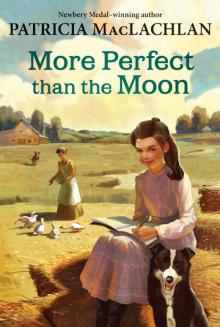 More Perfect Than the Moon
More Perfect Than the Moon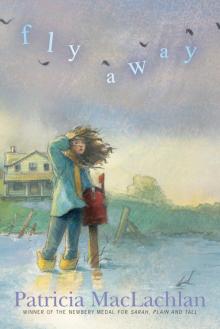 Fly Away
Fly Away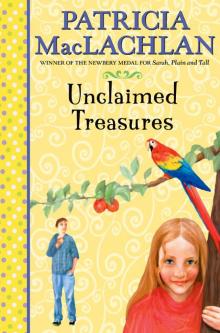 Unclaimed Treasures
Unclaimed Treasures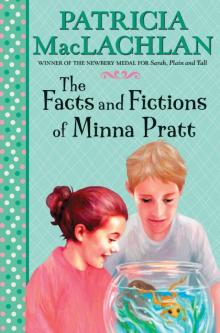 The Facts and Fictions of Minna Pratt
The Facts and Fictions of Minna Pratt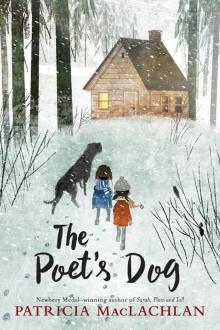 The Poet's Dog
The Poet's Dog Journey
Journey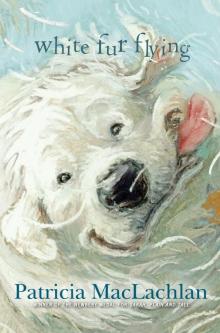 White Fur Flying
White Fur Flying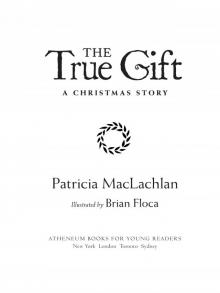 The True Gift: A Christmas Story
The True Gift: A Christmas Story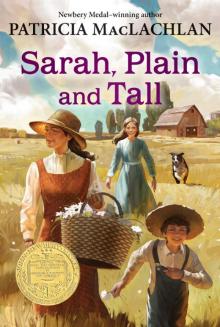 Sarah, Plain and Tall
Sarah, Plain and Tall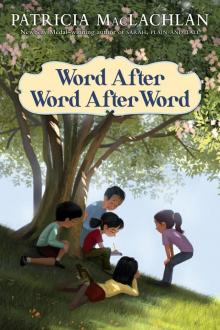 Word After Word After Word
Word After Word After Word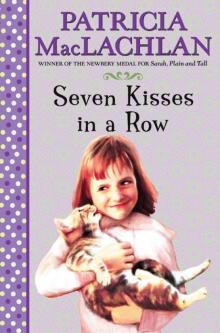 Seven Kisses in a Row
Seven Kisses in a Row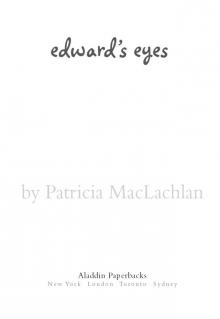 Edward's Eyes
Edward's Eyes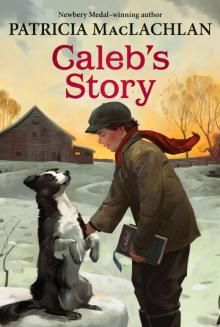 Caleb's Story
Caleb's Story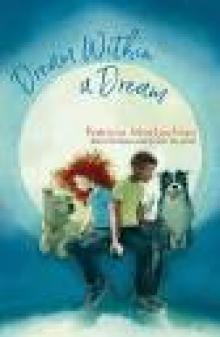 Dream Within a Dream
Dream Within a Dream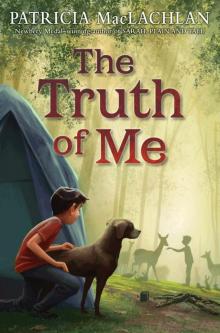 The Truth of Me
The Truth of Me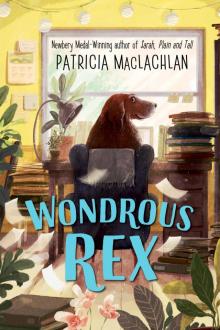 Wondrous Rex
Wondrous Rex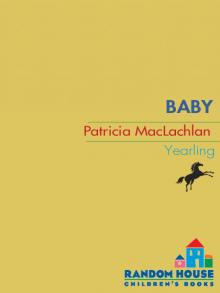 Baby
Baby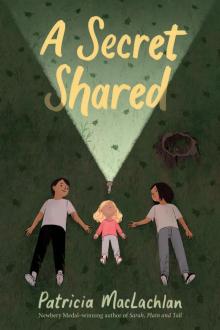 A Secret Shared
A Secret Shared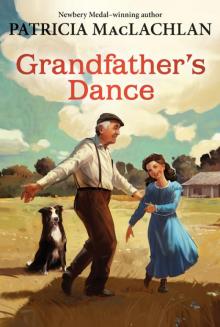 Grandfather's Dance
Grandfather's Dance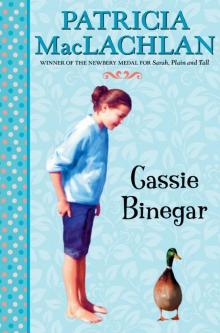 Cassie Binegar
Cassie Binegar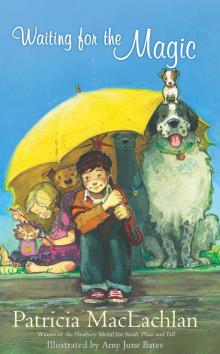 Waiting for the Magic
Waiting for the Magic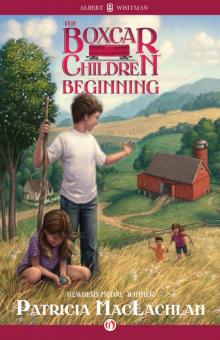 The Boxcar Children Beginning
The Boxcar Children Beginning My Father's Words
My Father's Words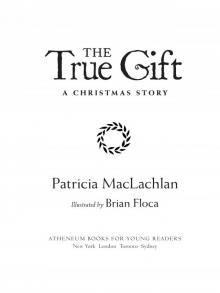 The True Gift
The True Gift